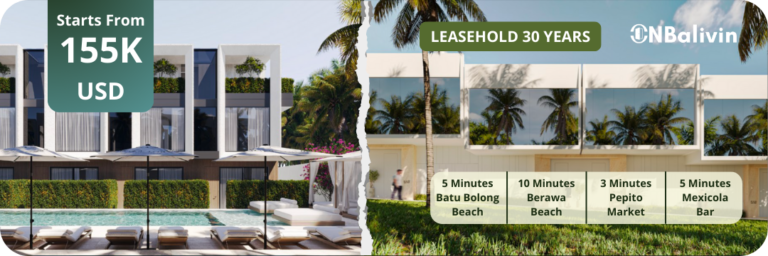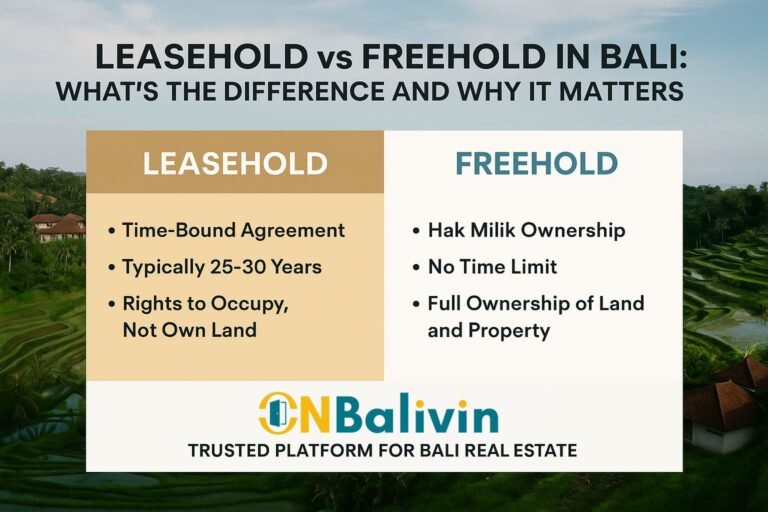





Leasehold vs Freehold in Bali: What’s the Difference and Why It Matters
Understanding property ownership structures in Indonesia particularly in high-demand areas like Bali. It can be complex, especially for foreign buyers or first-time investors. Two terms that frequently arise in real estate discussions are freehold and leasehold. While both allow individuals to occupy and utilize property, the legal mechanisms, duration of rights, and long-term financial implications differ significantly.
Freehold, referred to as Hak Milik in Indonesian law, represents the most complete form of land ownership. This title grants perpetual rights to the land and any structures upon it, enabling the owner to sell, mortgage, lease, or pass down the asset across generations. However, Indonesian regulations restrict freehold ownership to Indonesian citizens. As a result, foreign nationals are legally barred from directly holding freehold titles, unless they utilize certain legal vehicles—such as establishing a foreign-owned company (PT PMA) or entering into a prenuptial agreement with an Indonesian spouse and registering the property accordingly.
In contrast, leasehold is a time-bound contractual agreement, typically spanning 25 to 30 years, whereby the lessee obtains the right to occupy and use the property without owning the land. Leaseholds are particularly prevalent among expatriates, as they offer a straightforward, legally accessible pathway to residing in or investing in Indonesian real estate. While the initial capital outlay is generally lower compared to freehold properties, leasehold assets tend to depreciate as the lease term nears its end, making long-term capital gain less likely unless extension terms are negotiated early on.
The degree of control over the property also varies. Freehold owners enjoy the freedom to modify, renovate, or repurpose their land—subject to zoning regulations and necessary permits. Leaseholders may undertake improvements as well, but such actions must be explicitly permitted in the lease agreement and often require the lessor’s consent. A critical consideration is the renewal clause: if the agreement does not guarantee automatic renewal or extension rights, the tenant risks losing the property—and all improvements made—once the lease expires.
From a financial standpoint, freehold properties offer stronger asset security and are generally accepted as collateral by banks, making them more suitable for those seeking long-term stability or leveraging property for financing. Leasehold properties, on the other hand, are typically paid upfront in lump sums, and while they may generate rental income, their diminishing term can pose a challenge to resale value or future liquidity.
For foreign nationals, leasehold remains the most accessible legal avenue to “owning” property in Indonesia. However, more permanent solutions are available. By establishing a PT PMA, a foreign investor can acquire a Hak Guna Bangunan (Right to Build) title, which is valid for an initial period of 30 years and renewable for up to 80 years. Alternatively, eligible foreigners can obtain Hak Pakai (Right to Use), a legal form of ownership that can also be extended up to 80 years, provided the property meets a certain value threshold and is registered accordingly.
In summary, choosing between leasehold and freehold is ultimately a matter of balancing flexibility with long-term security. Leasehold suits investors looking for shorter horizons, lower entry costs, or temporary residence. Freehold (or its legal equivalents for foreigners) is ideal for those seeking multi-generational legacy, capital appreciation, and greater autonomy. Regardless of the path you choose, always engage a reputable notary or land consultant, conduct due diligence on the land certificate, and ensure that extension clauses, rights, and obligations are clearly defined in your contract.
If you’re looking to invest in Bali and want expert guidance in finding the right leasehold or freehold property, along with transparent, secure legal handling, visit www.onbalivin.com or follow us on Instagram @onbalivin for curated listings, insider tips, and personalized assistance.
✅ Onbalivin also provides full support for the establishment of PT PMA and obtaining Investor KITAS, making your transition to property ownership and long-term residence in Bali seamless and legally secure.
Onbalivin — trusted platform for Bali real estate, helping you secure your piece of paradise the smart way.
 Bedrooms:
1
Bedrooms:
1
 Bathrooms:
1
Bathrooms:
1
 Bedrooms:
3
Bedrooms:
3
 Bathrooms:
3
Bathrooms:
3
 Bedrooms:
3
Bedrooms:
3
 Bathrooms:
4
Bathrooms:
4
 Bedrooms:
4
Bedrooms:
4
 Bathrooms:
8
Bathrooms:
8
 Bedrooms:
2
Bedrooms:
2
 Bathrooms:
2
Bathrooms:
2


























